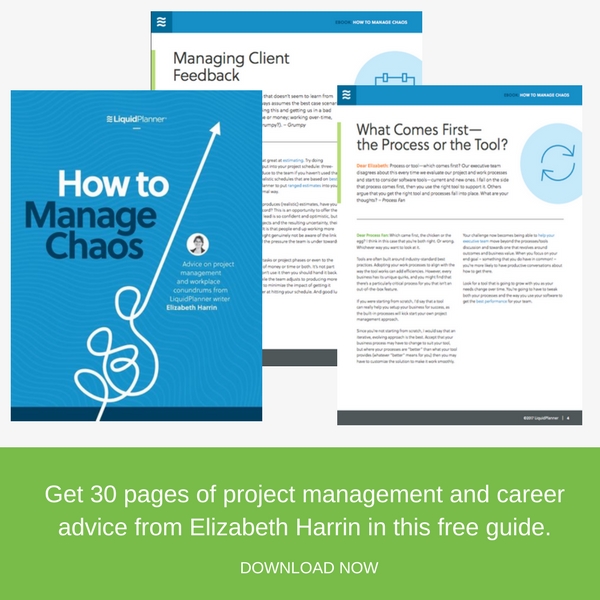Dear Elizabeth: I have been working in project management across several industries for several years – although not formally as a ‘Project Manager’. My spouse (a soon-to-be-retired Army Officer) and I are going through the formal PMP® training now to complete the test by January. We would love to explore some NGO or other overseas work for a few years before coming back to the States and working part time. What advice do you have for us?
Well, it sounds like you’ve got your next moves pretty figured out! There are a few things I would suggest that would support your career goals.
Get Your PMP® Quickly
You probably know that the PMP exam is changing early next year. I’ve been spending a fair amount of time looking at what is going to be new and while there’s nothing particularly radical, there are some technical changes within the processes that will no doubt influence the questions you are likely to see.
Personally, I think the new version of the guidance from PMI is better. It’s longer (it feels a lot longer) but it feels more modern. However, if you don’t want to start your exam prep all over again, book your exam now and take the current version of the test.
This is actually a great time to be getting certified: the change in the 2018 exam is going to really focus the mind! You might find it easier to make the time to revise the material if you know you have a hard deadline to meet.
As you know, you need to be able to prove your project management experience in order to take the exam. If you qualify, you won’t have any difficulty with the fact your resumé doesn’t have the job title Project Manager. Your experience, and your PMP credential, will speak for themselves.
Look at PM4NGOs
There’s a whole branch of project management dedicated to NGOs, and there’s a lot on offer at the PM4NGOs website. They have their own certification scheme, but you may find some resources there to help you plan what’s possible for working in a non-governmental organization as a project professional.
Capitalize on Veterans’ Support
I have worked with veterans from the Australian and UK militaries and the people I’ve met with these backgrounds have been excellent project managers. It’s well recognized that veterans can transition their skills into a project management career and there are a number of programs designed to support that happening.
PMI has support available for veterans including being able to join a local Chapter at no cost for the first year (as long as you are a member) and many Chapters have Military Liaison Volunteers. There are Chapters all over the world, so wherever you happen to end up with your overseas work, you will hopefully find one near you.
Be Flexible
Travelling for work as a couple is difficult, especially if one of you gets a job and the other is the ‘trailing spouse’. Having been both the spouse in work and then later the one left at home while my husband worked overseas, I know that it can be tough on both partners.
The ideal for you will be to find an overseas posting that allows you both to work, and work together. That might be possible with NGO opportunities, but is going to be less likely if you decide to take a corporate position overseas instead.
Contract work can be very flexible and well-compensated, so if during your research you decide that a corporate job meets your personal goals for spending time overseas, you could look at contract positions and enroll with some job agencies that specialize in placing managers in those roles.
Be conscious of the paperwork that goes with overseas work. There are visa, permits and all that to work through. Get advice from someone qualified to give it and only choose to work with reputable agencies that have your best interests at heart. And get insurance!
Build Your Other Skills Too
Getting a project management credential is great, but it isn’t the only thing that is going to secure you a job. If you want to work abroad, what language skills do you have? Will that shape where you choose to work?
What tools do you know how to use? You’ve got some project management experience already, so hopefully you’ve been able to use some of the common technologies that help schedule work and plan tasks.
Some days it seems as if there are almost as many project management and collaboration tools as there are employers, but there are some big industry players (like LiquidPlanner) that crop up time and time again. Make sure you’ve got some exposure to a few different types of software as that will make you a more rounded potential hire, especially for contract work.
Equally, check out free tools that are commonly used by organizations with tiny budgets for this sort of thing like NGOs such as Google Drive, Skype, and Slack.
Project management is a fantastic career that can open doors and help you change lives. I wish you all the best with your career journey!







